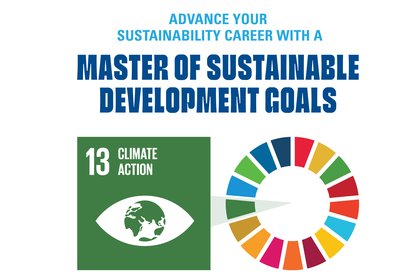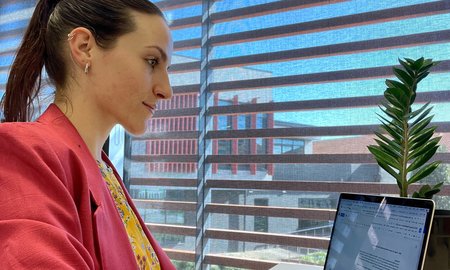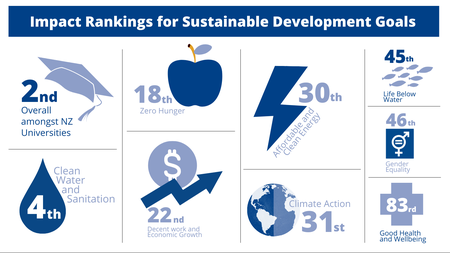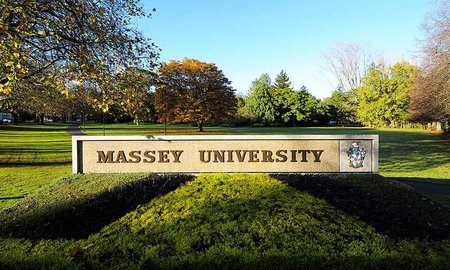
In response to the increasing need for graduates to work in the field of sustainability, Massey launched the Master of Sustainable Development Goals (MSDG) in 2020.
This is a transdisciplinary qualification that empowers graduates to tackle some of the most urgent issues facing humanity by providing them with a common core understanding of sustainability and the United Nations' Sustainable Development Goals (SDGs). Students have the opportunity to specialise in their chosen field and undergo an applied practical element incorporating theory and practice of the SDGs.
In 2024, the university will be launching a new specialisation in climate action, which will be available from Semester 1, 2024. The new specialisation joins the existing six specialisations of business and sustainability, disaster management, environmental sustainability, global development, economics for sustainability, and peace and security.
This specialisation will be offered both online and on campus (in the Manawatū) and can be completed in 18 months full-time or over three years part-time, with new enrolments accepted in January and July.
Co-ordinator of the new specialisation, Senior Lecturer Dr Samantha Gardyne says the climate action specialisation will equip students with the skills and knowledge required to work within the field of climate change, mitigation and adaptation.
“Students will study both indigenous and social sciences approaches to climate action and their interaction with policy, governance and international and local responses. Students can expect to engage in a diverse range of worldviews, including Māori and Pacific paradigms of sustainability and their responses to climate change as alternatives to dominant western paradigms. In addition, the specialisation will prepare students to critically understand and apply tools and approaches associated with climate finance, reporting, mitigation and adaptation."
Why Climate Action?
Universities around the world are increasingly recognising their responsibility to prepare students and society to actively contribute to mitigating and adapting to climate change.
Increasing numbers of universities, specifically in Europe, have developed qualifications focusing specifically on climate change. There is also a growing student interest in climate change education. A recent survey in the United Kingdom revealed that climate change is students’ number one concern and many want to see more university courses with a specific focus on tackling the issue.
Dr Gardyne says climate change is one of the most pressing environmental issues facing humanity.
“There is an urgent need for graduates who can lead future climate change solutions in all sectors of society. We cannot respond to this crisis with ‘more of the same’ or ‘business as usual’. As lecturers, we face the challenge of engaging our students with alternative ways of thinking and knowing, so that we can find innovative and transformative solutions to the challenges our communities face today."
The climate action specialisation will include an existing course, Climate Change Economics and Policy (offered by the School of Economics and Finance) and one new course which will be developed and implemented in Semester 2, 2024.
“The new course, Global and Local Responses to Climate Change, will engage students in critical explorations of climate change mitigation, adaptation and resilience. We will examine the complex relationship between global worldviews, state-led or professional practices and local and Indigenous worldviews and community-based or alternative livelihood practices responding to climate change," Dr Gardyne says.
Students will determine effective policy and practice responses to climate change in specific contexts. The course also investigates global and local climate change funding mechanisms, with specific focus on Aotearoa New Zealand and the Pacific.
In addition, during their 60-credit practicum, students will complete 320 hours working in an agency or organisation dealing directly with aspects of climate change, mitigation or adaption.
Career opportunities
There are increasing career opportunities in the field of sustainability, climate finance and funding, climate reporting and environment and social governance. This new specialisation will equip students to work in these fields.
“A decade ago, ‘chief sustainability officer or CSO’ was an emerging role, with many critics regarding it as 'greenwashing’. Today, sustainability positions are being appointed at record rate. We are reading a great deal about the rise of the CSO. For example, in 2020, the number of CSOs across Fortune 500 companies soared to 95, a number that grew more than 228 per cent since 2011," Dr Gardyne says.
Interested in studying a Master of Sustainable Development Goals?
Related news
Students dive into the world of Sustainable Development Goals
Embarking on a virtual journey to find out more about the United Nations Sustainable Development Goals (SDGs) has helped enable two Massey students to develop their social entrepreneurial skillset.

Massey’s commitment to Sustainable Development Goals recognised
Times Higher Education has released its 2021 Impact Rankings for Sustainable Development Goals (SDGs) - and it's good news for Massey University.

Massey a leading contributor to UN Sustainable Development Goals
Times Higher Education has again ranked Massey within the top 200 in all Sustainability Development Goals.
